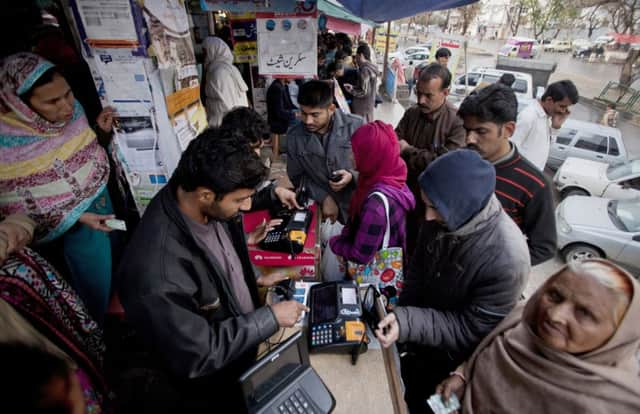Pakistan to fingerprint all mobile users


Every Pakistani who wants use of a device must ensure their name, phone number and fingerprints are on record or face losing their SIM card.
The measures are meant to tighten control of mobile phones and avert their use for Islamist attacks in the wake of a massacre carried out by Taleban militants two months ago at a school in Peshawar.
Advertisement
Hide AdAdvertisement
Hide AdSince the new measure was announced earlier this year, Pakistanis have been lining up at phone stores and in front of mobile vans and kiosks around the country to scan their fingerprints and verify their identities in order to keep their phones.
They have to show their IDs and fingerprints. If the scanner matches their prints with any in a government database, they can keep their SIM card. If not, or if they don’t show up, their mobile service is cut off.
In Pakistan many people get by without electricity, heating or running water. Mobile phones are among the few technological advances available to everyone and many cannot imagine their lives without one.
The 16 December attacks by the Pakistani Taleban on the school in Peshawar, which killed 150 people, most of them schoolchildren, shocked the nation.
It was a watershed that prompted a series of government measures, including intensifying a military offensive launched in June against militant strongholds.
Authorities also introduced military courts to try terrorism-related suspects and stepped up financial monitoring to make it harder for militants to transfer money.
As for mobile phones, the government last year introduced biometric machines designed to check users’ identities – making the check mandatory for anyone who wants to get a new SIM card.
But in the wake of the Peshawar attack, they’re now checking all users, regardless of when they got their SIM card, to make sure those who have been issued a SIM card are actually the ones using it. The project has been portrayed as a way to curb the use of mobile phones by militants and criminals in planning or carrying out attacks.
Advertisement
Hide AdAdvertisement
Hide AdIn explaining the measure, interior minister Chaudhry Nisar Ali Khan told parliamentarians earlier this month that he was sure the terrorists “will lose a big weapon”. A police official investigating the Peshawar attack said at least two of the SIM cards recovered from the scene were issued under the names of two residents of Punjab province. The two later told authorities their names were misused. The police official spoke on condition of anonymity because he was not authorised to discuss details of the investigation.
There are about 103 million SIM card holders in Pakistan and the goal is to recheck everyone by 13 April, said Kurram Mehran, from the Pakistan Telecommunication Authority (PTA).
Pakistan’s five mobile phone companies worked with the PTA to install fingerprint scanning devices around the country, Mr Mehran said.
Already about 60 million SIM cards have been verified and seven million blocked, he said. Punjab province chief minister Shahbaz Sharif said on Wednesday that it was costing the government “millions of rupees”. The former head of the National Counter Terrorism Authority, Khawaja Khalid Farooq, said the verification could help authorities trace mobile phone users who commit crimes.